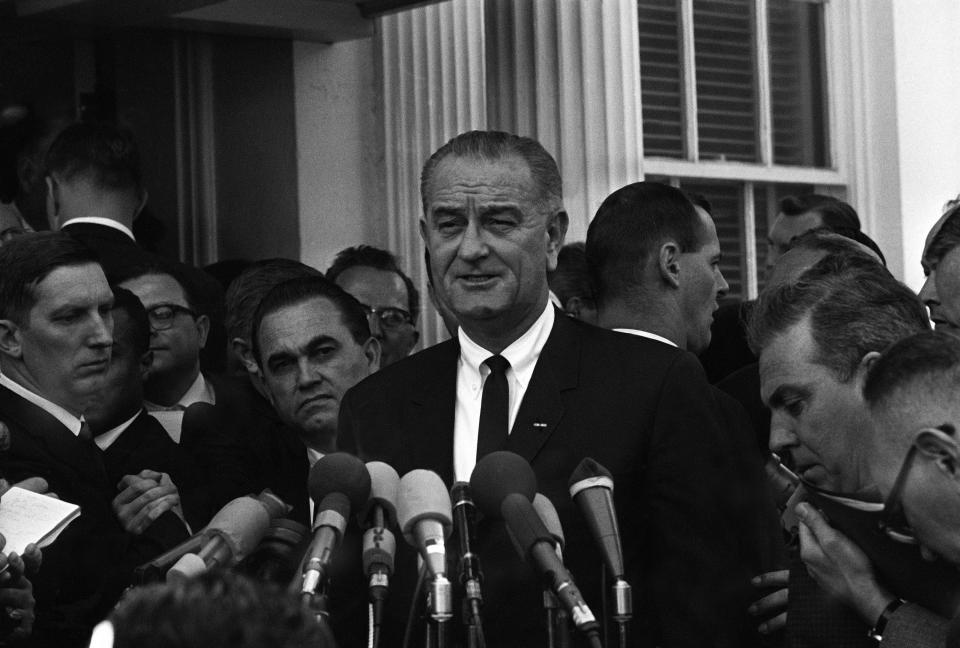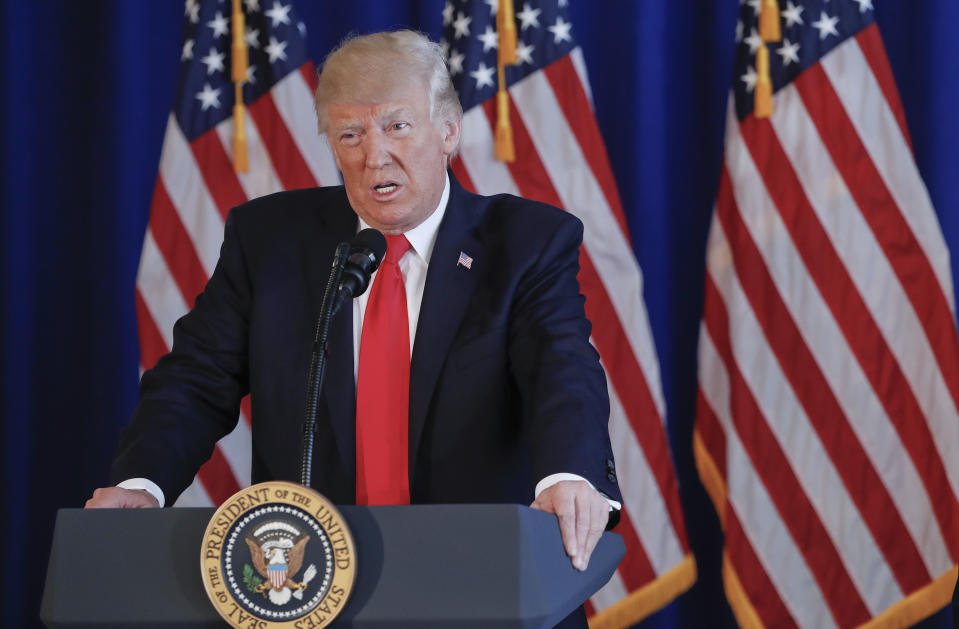How presidents should speak about racist violence: Lessons from history

Critics are rightly castigating President Trump for issuing a series of vague, opaque statements in the wake of white supremacist-fueled violence that rocked Charlottesville, Va., this weekend. In response to the violence that claimed three lives and injured many, Trump said this: “We condemn in the strongest possible terms this egregious display of hatred, bigotry and violence on many sides,” before repeating “on many sides,” as if to emphasize that it was really the “many sides” that were at fault.
Trump generated much support from the “alt-right,” including white nationalists, during last year’s presidential campaign. As a candidate and now as president, Trump has established a pattern of refusing to repudiate in clear moral terms the white supremacists who backed his White House run, and their hate-fueled ideology.
Trump, remember, was also the candidate who spent much of last year mocking President Barack Obama for failing to use the specific phrase “radical Islamic terrorism” in discussing attacks inspired by ISIS. But it’s worth taking a step back and considering how his silence on white supremacy stands in contrast to the moral clarity that past presidents have demonstrated under similarly terrible circumstances. Trump’s critics are therefore drawing on a fairly rich recent history in which Democratic and Republican presidents have reacted to white supremacists, the ideology they espouse and the violence they commit, with swift and unequivocal condemnations infused with moral clarity and a higher vision of the national well-being. Even divisive presidents who experienced white supremacist-fueled violence on their watch have often risen to the occasion.

Take President Lyndon Johnson’s reaction to Alabama troopers beating nonviolent civil rights demonstrators on the Edmund Pettus Bridge in Selma in 1965. Eight days later, Johnson delivered an address before a joint session of Congress in which he urged the swift passage of voting rights legislation to defeat the evil of white supremacy with constitutionally inscribed virtues such as equality and justice. “Rarely are we met with a challenge, not to our growth or abundance, our welfare or our security, but rather to the values and the purposes and the meaning of our beloved nation,” Johnson declared. “The issue of equal rights for American Negroes is such an issue. And should we defeat every enemy, should we double our wealth and conquer the stars, and still be unequal to this issue, then we will have failed as a people and as a nation.” When he invoked the slogan from the civil rights movement — “We shall overcome” — he left no doubt about where he and the United States stood on the cause of racial equality, even as he recognized the political costs to Democrats that a full-throated embrace of civil rights exacted.
Thirty years later, President Bill Clinton gave what was probably the most potent address of his presidency. He spoke at a memorial service for the 168 people murdered by white nationalist Timothy McVeigh in a truck bomb attack on the Alfred P. Murrah Federal Building in Oklahoma City. Even though Clinton was in a red state, he used his speech to offer a vision resting on moral truth and constitutional certainty that his numerous critics long claimed was absent from his record in public service. Clinton said the “one thing we owe those who have sacrificed is the duty to purge ourselves of the dark forces which gave rise to this evil,” a rebuke of the white supremacy and militia movement from which McVeigh had come. “They are forces that threaten our common peace, our freedom, our way of life,” he said, announcing that these forces had to be extirpated from American society.
One of the best moments of George W. Bush’s oft-divisive presidency occurred six days after the Sept. 11, 2001, terrorist attacks. Bush traveled the short distance from the White House to the Islamic Center of Washington, D.C. In a time of rising anti-Muslim feeling in the U.S., he reminded the nation that “America counts millions of Muslims amongst our citizens, and Muslims make an incredibly valuable contribution to our country. … And they need to be treated with respect. In our anger and emotion, our fellow Americans must treat each other with respect” — a clear warning to racists and anti-Muslim activists that violence and prejudice targeting any group, including Muslim Americans, would be countered with the full force of the United States.

President Barack Obama had one of his moments of moral clarity in the aftermath of a crazed Confederate-flag-waving white supremacist who hoped to start a race war when he entered a church in Charleston, S.C., and murdered nine African-American worshippers. The white supremacist “surely sensed the meaning of his violent act,” Obama announced in a eulogy from the pew of the church. “It was an act that drew on a long history of bombs and arson and shots fired at churches — not random, but as a means of control, a way to terrorize and oppress. An act that he imagined would incite fear and recrimination; violence and suspicion. … Oh, but God works in mysterious ways. God has different ideas.”
Admirable as these statements were, with the exception of LBJ’s, they didn’t require extraordinary political courage — white racists or nationalists weren’t part of anyone’s voting base until Trump came along. Clinton wasn’t taking a big political risk by denouncing McVeigh.
Presidential candidates have at times failed to repudiate white nationalism or issued barely disguised appeals to racism. In 1980, GOP nominee Ronald Reagan delivered his infamous kickoff campaign speech by invoking “states’ rights,” code words for defending segregation, in Neshoba County, Miss., where three civil rights workers had been slain. In 1988, Republican presidential nominee George H.W. Bush ran the Willie Horton ad, which trafficked in racist stereotypes by portraying blacks as rapists and murderers. (The spot prompted a deathbed disavowal by Bush’s campaign strategist, Lee Atwater.)
Nonetheless, there are few precedents for a president refusing to denounce acts of white nationalist violence in terms of moral outrage and as unambiguous violations of the American creed. Notwithstanding subsequent White House efforts to revise Trump’s Charlottesville statements, his comments should be seen in their proper context and for what they actually are: a new low in the modern history of the American presidency.

Matthew Dallek, associate professor at George Washington’s Graduate School of Political Management, is the author of Defenseless Under the Night: The Roosevelt Years and the Origins of Homeland Security
Read more from Yahoo News:

